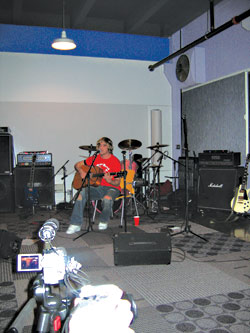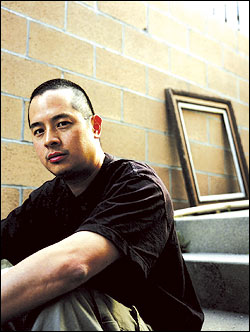For such a user-friendly place, the Internet sure does mystify people. Take “blogger,” a neutral term that has lately become a 21st-century catchall for “bogeyman” among media professionals who ought to know better, including a few with blogs. Because the old-media mind-set remains profit-driven, right now a lot of folks are trying to figure out how to cash in on blogging, an outlet that grew in popularity precisely because it was undertaken by people with no delusions of making money from it. Now, something similar seems to be happening with another buzzy Net term: podcasting, which broadly refers to any audio or video file posted for download but which usually connotes something thematic and lengthy, like a radio show. That buzziness is one reason that over the weekend of Feb. 25–26, the Triple Door hosted a curious symposium called the Podcast Hotel.
A few years ago, musician/blogger Momus noted that the old Andy Warhol axiom that everyone in the future would be famous for 15 minutes had been turned on its head—thanks to the microniching of the marketplace, everyone will now be famous in the eyes of 15 people. So the Podcast Hotel’s theme, “Let’s Get Famous,” makes a certain sense. Still, the event literature’s assurance that the subtitle was chosen “with tongue firmly in cheek,” and that it was conceived of as an “unconference”— a species of meaningless doublespeak worthy of the current administration—did not bode well.
Neither did AudioBlog.com founder Eric Rice’s opening remarks, a generic nod to the inevitable arrival of THE FUTURE. Pacing in front of a screen displaying his talking points, Rice informed us that the Triple Door “is gonna be in the top 10 of Google for a long time because of this” before uttering the inevitable, “I think of podcasting as the new grunge,” to very loud groans. Later, he showed us some freshly shot homemade video of a handful of clichéd Seattle images (coffee! A Starbucks sign! Pike Place Market!), edited to the music of a mediocre hardcore band. THE FUTURE did not look bright.
Things improved, as they often do at conferences (of both the regular and “un” variety), when the panels got more specific, as with the final pair on Saturday. First up was an artists’ roundtable featuring singer-songwriter and podcaster Samantha Murphy, Cilette Swan of Gypsy Soul, IODA’s Tim Mitchell, and Dave Dederer of the Presidents of the United States of America. Dederer and Mitchell dominated; the latter played the funny, worldly cynic, claiming that music magazines only review albums from labels that buy ads. (“Bullshit!” I yelled.) Dederer was clear and blessedly bullshit-free, pointedly refusing to shed tears for any artist not smart enough to read the fine print of their contracts and contrasting his debut’s shelf life pre-iTunes, when the album was owned by Sony, and post, when the band purchased the masters. Able to promote their work (and, though Dederer didn’t say it, capitalizing on the fact that more people want the hits they know than the albums they don’t), PUSA increased their income from $1.20 an album (per-month average sales: 1,000) to 70 cents per individual download (per-month average sales: over 10,000). So THE FUTURE looks pretty good for Web-savvy artists.
The final panel concerned broadcasting rights, a tricky area for anyone using copyrighted music as part of their podcasts. As it turns out, ASCAP and BMI, America’s largest performance rights organizations, have been quick to come to grips with the form, offering licenses for digital use of their copyrights. But when Paul Anthony of Rumblefish, the moderator, asked for a show of hands from those in the crowd who’d purchased those licenses, almost no one raised them.
This is the crux of podcasting, and a major reason to be skeptical about an event like the Podcast Hotel: Most people with any interest in the medium won’t be paying $100 to learn more about it. They’ll Google for technical information, rely on already familiar blogs and MySpace friends to spread the word, ignore copyright laws for as long as they don’t get caught, and safely avoid both future-speak blather and folks like the gentleman I overheard attempting to chat someone up by telling her about the domain names he used to own. Though come to think of it, I may utilize “I had youredabomb.com” myself the next time I’m at an unconference.








